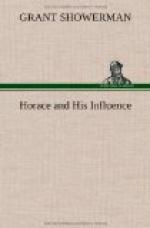Besides the invisible, and the greatest, effect of Horace in the moulding of character in literature, is the visible effect in literary creation. His inspiration wrought by performance as well as by precept. The numerous essays in verse and prose on the art of letters which have been prompted by the Ars Poetica are themselves examples of this effect. They are not alone, however, though perhaps the most apparent. The purer literature of the lyric also inspired to creation, with results that are far more charming, if less substantial.
In the case of the lyric inspired by the Odes, as well as in the case of the critical essay inspired by the Ars Poetica, it is not always easy to distinguish adaptation or imitation from actual creation. Bernardo Tasso’s Ode, for example, and Giovanni Prati’s Song of Hygieia, while really independent poems, are so charged with Horatian matter and spirit that one hesitates to call them original. The same is true of the many inspirations traceable to the famous Beatus Ille Epode, which, with such Odes as The Bandusian Spring, Pyrrha, Phidyle, and Chloe, have captured the fancy of modern poets. Pope’s Solitude, on the other hand, while surely an inspiration of the second Epode, shows hardly a mark affording proof of the fact.
To some of the most manifest imitations and adaptations, it is impossible to deny originality. The Fifth Book of Horace, by Kipling and Graves, is an example. Thackeray’s delightful Ad Ministram is another example which must be classed as adaptation, yet such is its spontaneity that not to see in it an inspiration would be stupid and unjust:
AD MINISTRAM
D_ear Lucy, you know what my wish is_—
I_ hate all your Frenchified
fuss_:
Y_our silly entrees and made dishes_
W_ere never intended for us_.
N_o footman in lace and in ruffles_
N_eed dangle behind my arm-chair_;
A_nd never mind seeking for truffles_
A_lthough they be ever so
rare_.
B_ut a plain leg of mutton, my Lucy_,
I_ prithee get ready at three_:
H_ave it smoking, and tender, and juicy_,
A_nd what better meat can
there be?_
A_nd when it has feasted the master_,
’T_will amply suffice
for the maid_;
M_eanwhile I will smoke my canaster_,
A_nd tipple my ale in the
shade_.
In similar strain of exquisite humor are the adaptations
of the
Whichers, American examples of spirit and skill not
second to that of
Thackeray:
MY SABINE FARM
LAUDABUNT ALII
S_ome people talk about “Noo Yo’k"_;
O_f Cleveland many ne’er
have done_;
T_hey sing galore of Baltimore_,
C_hicago, Pittsburgh, Washington_.




